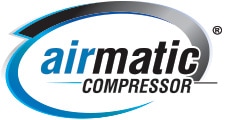Air purity is crucial in many applications, as even the smallest amount of oil can lead to product or equipment damage. This is especially true for industries such as medical and food processing that must adhere to strict quality and safety standards. To address these concerns, many companies are turning to oil-free air compressors.
Oil-Free Air Compressors Vs. Oil Air Compressors
Knowing the difference between oil-free and oil air compressors is critical in deciding which option is best for your application.
Oil Flooded Compressors
No matter the type of air compressor, they all rely on moving parts. Failure to properly lubricate moving parts can lead to equipment damage. Oil-injected air compressors use oil-based lubricants, making them a popular choice for various industrial and heavy-duty applications. While this type of compressor is rugged and versatile, they require a lot of maintenance, and operators have to regularly check oil levels and replace filters.
One of the biggest drawbacks of oil-injected air compressors is the risk of oil contamination. Oil used to cool, seal, and lubricate the machine can contaminate the compressed air. Oil contamination can lead to product damage, downtime, and rework. This is why industries that require high purity compressed air rely on oil-free compressors.
Oil-Free Compressors
Rather than using oil as a lubricant, oil-free compressors rely on an alternative lubrication medium, such as water, or a mechanical separation between the oil-containing areas and the compression chamber. Doing this eliminates all risks of oil contamination, making oil-free compressors a common choice for industries where even the slightest amount of oil is unacceptable, such as food & beverage, medical, pharmaceutical, chemical, and more.
While oil-free compressors may have a higher upfront cost, they are cheaper to lubricate, easier to operate, and feature more compact and portable designs.
Oil-Free Air Compressors: How They Work
For applications where air purity is a top priority, it’s important to use oil-free air compressors. This type of compressor either has no mechanical contact inside the compression chamber, or it relies on alternate materials, like water, to protect the mechanism without the need for lubrication. Since the lubrication of gears and bearings occurs outside the compression chamber, adequate sealing prevents the compressed air from becoming contaminated with oil, resulting in a 100% oil-free air supply.
When in operation, oil-free air compressors follow these main procedures:
- Air Expulsion. The compressor will run through a set of steps during its on-time. It will draw air in, pressurize it, and then expel it.
- Filtration. The air filter will eliminate any contamination to the air. This keeps other components safe from damage, while also preventing spoilage to sensitive products.
- Pressurization. Air is pressurized inside the compressor. Once this process is complete, the air is expelled.
- Cooling. A designated cooling system will reduce the air’s temperature as it is expelled. A condensate drain collects any liquid byproduct to prevent the onset of rusting.
Quality Oil-Free Air Compressors from Airmatic Compressor
Airmatic Compressor has been in the industry for nearly 50 years. As a customer-focused company, we can solve your unique challenges with quality air compressor solutions. Our oil-less air compressors are used across a wide variety of applications to deliver clean, high-purity compressed air for industries such as food and beverage, life sciences, oil & gas, and many others.
For more information about our oil-free air compressors, contact us or request a quote today.
